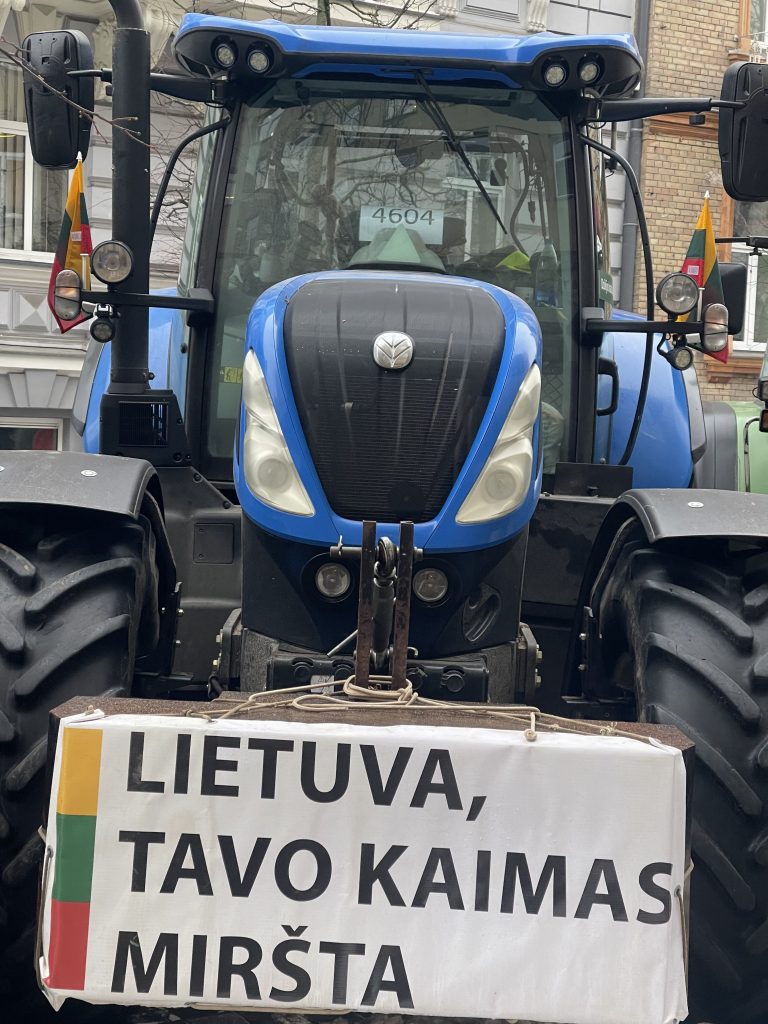The storm that hit Lithuania’s wintry fields has moved on to the country’s capital. It is not only the dark clouds that threaten future harvests, but also the growing frustration that has been born in the heart of Europe’s agriculture valleys. However, the recent increase in farmers’ protests in Lithuania is more than a local grievance. We are facing a clear symptom of Europe’s agrarian anxiety, which signals the serious challenges facing the farming community today.
Why are the roots of frustration among Lithuanian farmers deepening?
European Commissioner Janusz Wojciechowski, opening the Agri-Food Days 2023 in Brussels, underlined that every year we are losing more and more farms that are no longer sustainable. The statistics are really quite sad. In 2020, there were 9.1 million farms in the EU, down 37% from 2005. This means that 5.3 million farms are simply no longer there.
An unprecedented peaceful and very united farmers’ protest is currently taking place in Lithuania. As in many EU countries, they have come out onto the streets. Farmers’ tractors, the symbol of rural livelihoods, have become the emblem of the protest itself. The reasons for protesting are many and the specific concerns that weigh on the shoulders of those who work the land vary. But low farm gate prices, high operating costs, the relentless instability of the market and periods of crisis – the effects of the pandemic and the ongoing war – have all put many farmers in the same insecure situation.
I will come back to the number and variety of challenges facing farmers, which perfectly reflect the diverse role of agriculture in the EU’s socio-economic system. For now, let us focus on the fact that the roots of farmers’ frustration are getting deeper. Agricultural policy, both national and in the corridors of Brussels, is often at the heart of their dissatisfaction. I would like to stress here that the EU’s Common Agricultural Policy (CAP), launched in 1962, is a partnership between agriculture and society, as well as between Europe and its farmers. It aims to support them and to improve agricultural productivity by ensuring a stable supply of affordable food.
Its objectives include protecting Member States’ farmers so that they can make a reasonable living, helping to combat climate change and sustainably manage natural resources, preserving rural areas and landscapes across the EU, and keeping the rural economy alive by boosting job creation in agriculture, the food industry and related sectors.
Although the CAP is a pillar of EU integration, it has its critics. Subsidy distribution, bureaucratic confusion and a perceived gap between politicking and practice are among the repeating themes in the list of reasons for farmers’ frustration.

European farmers are not just the backbone of the food supply chain
In recent years, especially since 2019 (or the launch of the Green Deal), farmers’ protests have increased in the EU, with strong organisation and large numbers of participants. Significant demonstrations have taken place in countries such as the Netherlands, Germany, France, Poland, Spain or Italy.
These protests have been motivated by a wide range of interlinked issues. Economic pressures, such as low producer prices and unfair competition, as well as challenges related to agricultural policy, in particular the complexity and inequality of the CAP. Environmental rules, undoubtedly crucial in the face of climate change and the loss of biodiversity, are nevertheless confusing in the maze of requirements. Farmers, the guardians of the vitality of Europe’s countryside, are often ‘stuck’ between environmental sustainability provisions and the realities of agricultural production.
The recent protests in the Netherlands, prompted by measures to reduce nitrogen emissions, illustrate this tension – the delicate balance between preserving nature and sustaining livelihoods. Environmental regulations aimed at reducing emissions and promoting sustainability are being contested. Farmers argue that the practical aspects of farming and economic sustainability are often ignored.
The protests also echoed the call to respect and re-evaluate the role of agriculture in society, highlighting the need for an inclusive dialogue between policy makers, society and the farming community. The overarching objective is to comprehensively address the multiple challenges of modern agriculture and ensure a sustainable and prosperous future for all stakeholders.
Recognising the indispensable role of farmers is, at the very least, essential. They are not only the backbone of the food supply chain but also the custodians of our lands and traditions. Their hard work and dedication is the foundation on which food security is built, and farmers’ well-being is therefore synonymous with the health of society as a whole.
Protests are not just a cry for economic aid or policy reform. They ask for recognition and respect. Farmers are not just food producers – they are also preservers of cultural heritage, pioneers of innovation and defenders of the environment. But the public perception that such a multifaceted role often does not match expectations fosters a sense of marginalisation.
The solution: a future shaping policy based on community realities
The response to agrarian frustration is not a simple one. It requires an integrated approach that recognises the concerns of the farming community while addressing the broader challenges of sustainability, economic viability and social justice. A constructive dialogue involving all stakeholders is key. Policy makers, farmers, industry actors and civil society need to come together to develop policies that are not only fair and forward-looking, but also based on the realities of farmers’ lives.
Investment in rural infrastructure, support for sustainable practices, fair trading conditions and genuine cooperation with the agricultural sector are just some of the steps that can pave the way. The EU’s commitment to food security, rural development and environmental sustainability is the policy basis on which these actions can be taken. Of course, the path would not be easy and would require a joint effort, a shared vision and a basic willingness to adapt and innovate.
The echoes of agrarian frustration will spread from Lithuania to the far corners of the EU. Let us therefore remember that the health of European agriculture is inseparable from the health of society, the economy and the environment. Addressing the challenges facing farmers is not just about addressing the turbulence in the sector. It is about nurturing the very roots of Europe’s prosperity and sustainability. The fields of Lithuania, and indeed of Europe as a whole, are not just farmland, but the horizon of a healthy life, where the seeds of a sustainable and inclusive future must be sown with care, understanding and respect. Recognising the vital role of farmers, we are building a sustainable future for all.


